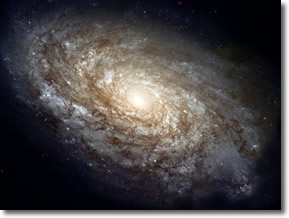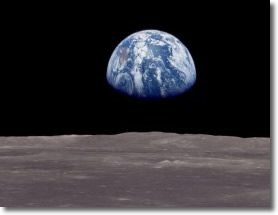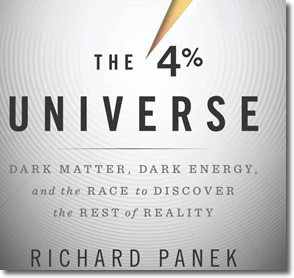» How big is the universe? If you answered » "too big for the human mind to comprehend" .. you're right. In other words » mind-blowingly big. But what the heck. Let's give it a shot, anyway.
 I've always enjoyed the challenge of trying to get a handle on intellectually-challenging concepts.
I've always enjoyed the challenge of trying to get a handle on intellectually-challenging concepts.
Plus, it's good to have our minds blown from time to time. Means we're continuing to challenge ourselves.
Our ability to use our minds .. to think, to reason, to learn & solve problems is (supposedly) the #1 distinguishing characteristic that makes us human. So ..
.. let's start local. How big is the earth? Answer » ~25,000 miles in circumference (40K kilometers).
That means it would take a Boeing 747 (with a typical cruising speed of 567-MPH or 913-KPH) about 44 hours to circle the planet (.. assuming mid-air refuelings, no head- or tailwinds, and other such impossibilities). Nearly 2 days. Sound reasonable? Two days in a 747 .. is something we can all handle. "More peanuts, please."
At that same speed, how long would it take our 747 to reach the moon? (assuming it could fly in space) Answer » 17 or 18 days (.. assuming an average distance to the moon of 240-K miles or 385-K KM).
 About 2½ weeks in a 747. Still not bad. (In other words, we would have to circle the earth 9 or 10 times to equal the distance to the moon.)
About 2½ weeks in a 747. Still not bad. (In other words, we would have to circle the earth 9 or 10 times to equal the distance to the moon.)
That also means a ROUND-TRIP loop to the moon in a 747 would take 5 weeks .. or roughly a MONTH. "What? No more peanuts?"
Leave on one full moon, return on the next. The time-period of a month seems to work well here (.. for our round-trip excursion to the moon), no?
Let's say we left a MIRROR on the moon. A big one. Once we returned to earth, how long would it take LIGHT from our super-powerful flashlight to reach the moon, bounce off our mirror, and return to earth? Answer » about 2½ seconds.
[ 2½ seconds vs a month. Hmm. Light seems MUCH faster. Unlike the speed of our 747, the speed-of-light can be difficult to grasp. But we can all handle the idea of 2½ seconds. So let's proceed. ]
How many of these round-trips to the moon would we have to make in order to equal the distance to our sun (.. some 93 million miles away)? Answer » about 200. (We're talking ballpark numbers here.)
In other words, it would take our 747 about 17 years (200 month-long trips / 12 months per year) to reach the sun. (Let's hope the air conditioner works.)
Seventeen years would be a looong trip, but it's still something we could do .. cuz all of us will likely live longer than 17 years.
So we went from 17 DAYS (.. 1-way to the moon) to 17 YEARS (.. 1-way to the sun). Dig it. [ 17 years ago .. that was 1994, back when the first George Bush was President. The dad, not the son. ] Days to years. A comparable number of days to years.
This provides excellent relative scale, no? Because we all have an excellent feel for the proportions of how a DAY compares to a YEAR. ( You should be having a very cool déjà vu right about now.) Days-is-to-years as the moon-is-to-the-sun. Comparing similar scales of time to distance. Big difference, but conceptually managable.
Well then .. how long does it take LIGHT from the sun to reach the earth? Answer » 500 seconds, or » 8 minutes, 20 seconds. Hmm. 8 minutes vs 17 years. Light is definitely much faster than our (seemingly dog-slow) 747.
The speed-of-light still seems too fast to grasp (mentally), but you should, at least, be beginning to get a FEEL for it.
This is important because the distances in space are so big/vast that the distance light travels in one year (a LIGHT-YEAR) is used as the standard/default yardstick (or "meter") of measurement out there.
••• today's entry continues here below •••
 Getting a Feel for Big Numbers
Getting a Feel for Big Numbers
Now we're gonna start using big numbers. So let's try to get some perspective.
How long would it take to COUNT to a MILLION, using the 1-Mississippi rate of 1-number-per-second?
Answer » 11 days (+ 13 hours, 46 minutes).
How long would it take to count to a BILLION?
Answer » 31 years (+ 8 months).
In other words, this is a huge number, but we can still deal with it .. cuz most of us can conceptualize 31 years. [ 31 years ago was 1980. Jimmy Carter was President. ]
How long would it take to count to a TRILLION?
Answer » 31,000 years. This number is so big that our minds have trouble dealing with it. If we go back all the way to the time the paintings were made at Lascaux, we're only HALF way there (.. half way to 31,000 years ago).
Not that the transition .. from 11 days to 31 years is exactly what I would call a baby step .. but uh, have you noticed how Trillion-with-a-T seems to take off with a life of its own? .. leaving Billion-with-a-B far behind in its dust.
[ Think about those caves at Lascaux the next time you hear somebody mention our national debt ..
.. or watch it tick over to another "trill," which it looks like it will be doing here very shortly.
Think about those paintings. Done (by our ancestors) so long ago.
Every member of congress should be required to mount a debt clock prominently on the wall of their office .. surrounded by pictures of young kids .. the ones who will be required to pay it back.
Shameful how they continue to saddle our kid's future with this kind of debt .. for political advantage.
UPDATE - 11 November, 2011 » Since this topic is so different from the original, I cut & reposted it in its own, separate entry, titled » How Big is a Trillion? (or the Immorality Leaving such an Enormous National Debt for Our Children to Pay)
Ideally, I would love for readers to read both entries together (.. the way I wrote them). But I realize this may be asking a bit much.
Sorry. Got carried away there. The T-word sent me into national-debt orbit. I'm back. Let's return to our Universe. ]
How far does light travel in 1 year (.. i.e. one LIGHT-YEAR)? Answer » 6 trillion miles. In other words, it would take nearly 200,000 years of counting to reach 6 trillion. Difficult for the mind to deal with this kind of number or this kind of distance.
 Mind-Blowingly Big
Mind-Blowingly Big
How far away is the closest star outside our solar system?
Answer » 4 light-years. That's ~25 Trillion miles .. a number represented by some 800,000 years of counting (.. one-Mississippi, two-Mississippi..).
So we barely make it to the closest star outside of our solar system and, already, our ability to grasp the concepts-of-distance required here has clearly broken down.
But let's not stop there. Let's go ahead and blow our minds a little more (.. uh, a LOT more).
How far from one end of our Milky Way galaxy to the other?
Answer » 100,000 light-years. (That's a LOT of Mississippi's, Dawg.) Humbling, no? Feeling a tad insignificant yet? These distances are completely mind-blowing, and we havent even left our galaxy.
How many other galaxies exist in the Universe (.. that we know about)? Answer » 100 Billion.
A little celestial trivia while we talking about our galaxy » We all know that it takes the EARTH one year to orbit once around the sun .. but how long does it take our SUN (.. and therefore our solar system) to make one orbit/rotation around our Milky Way galaxy? Answer » ~200 Million years.
How far away is it to the galaxy (Andromeda) that lies closest to our Milky Way? Answer » 2½ Million light-years. Our attempt to get a handle on the distance involved in reaching our nearest neighboring galaxy .. is mind-blowingly difficult.
I stumbled upon this line of inquiry while reading a book named » The 4% Universe .. after folks won the Nobel Prize in Physics for their research in this field. You can get a decent handle on the subject » HERE (.. YouTube video, part 1 of 4).
I became curious about Dark Matter not long after I heard the call.
 Dark Matter & Levels of Ignorance
Dark Matter & Levels of Ignorance
You know the four levels of knowledge & ignorance »
- Stuff we know that we know.
- Stuff we know that we dont know.
- Stuff we think we know, but that we dont REALLY know.
- Stuff we dont even know that we dont even know.
How is it that the more I learn, the more I realize what I dont know?
When I finally "saw the light" on dark matter (.. an intuitive glimpse into what it means) .. I had a strange emotional response.
Very weird, cuz this stuff is totally "intellectual". Not anything I would associate with emotions. So why the weird disturbing feeling?
Yes, it left me feeling disturbed, unsettled. ("Ick.") But I dont/cant understand why (.. which only makes it seem all the more unsettling). Something about the insight definitely bothered me.
I have the audio-book for The 4% Universe (.. to help save my eyes) .. and right at the very end of the second CD (of a total of 9 CDs) » boom! .. that's when it hit me. My reaction makes no sense.
My background is in nuclear power. So I am no stranger to dealing with challenging concepts. (In fact, that's the very reason WHY I was drawn to nuclear energy.) And there exist similarities between the very big and the very small. Conceptual parallels.
 Out with the Old, In with the New
Out with the Old, In with the New
Today we have a whole new model of the universe .. MUCH different from the one you and I were born into.
Today we know MORE of what we dont know .. which is usually better than NOT knowing .. what we dont know. (Moving up the ladder of ignorance .. from #4 to #2.)
The thing to keep in mind .. is that .. the Universe was here long before you or I ever arrived. And it will remain long after we're gone. (Very long after.)
It has seen a lot of humans come and go .. Socrates, Plato, Alexander, Caesar, Anselm, Genghis, Gutenberg, Leonardo, Galileo, Michelangelo, Shakespeare, Newton, Voltaire, Napoleon, Dostoevsky, Nietzsche, Einstein, Gandhi. Even Elvis. Most recently, Steve Jobs.
I have a buddy who uses this method (.. of breaking-up conceptually big-things into smaller, bite-sized chunks) .. as a pre-formatted time-line to deal with LIFE itself.
[ Life and the Universe go together like ... like déjà & vu. Along with notions of God, such subjects fall under the heading » Bigger-Than-Us, or Immoveable Objects .. which stimulate the imagination. ]
Anyway, he says » "Scripture says we get 70 years. If you break that up into 7-year chunks, that gives you one chunk for each finger." [ 7, 14, 21, 28, 35, 42, 49 .. you get the idea. ]
Neither of my parents, however, made it to 70. (Not even close.) So, as always, YMMV. ■
UPDATE - here's a very cool link from Peter .. from the Nikon site titled 'Universcale'. (Thanks PS.)
For more along these lines, here's a Google search preconfigured for the query » how big is the universe, another for » the 4% universe richard panek, and lastly one for » dark matter dark energy nobel prize physics
